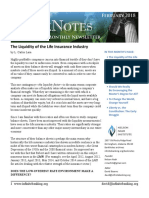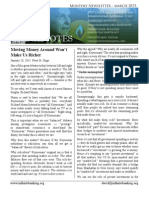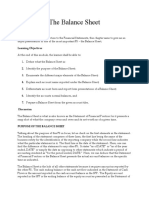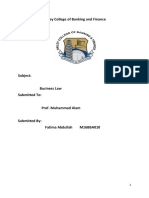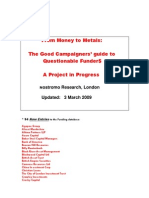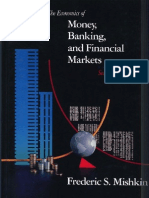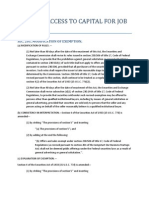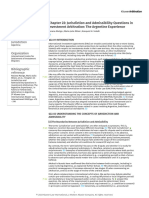Ank Otes: Confusing Capitalism With Fractional Reserve Banking
Ank Otes: Confusing Capitalism With Fractional Reserve Banking
Uploaded by
Michael HeidbrinkCopyright:
Available Formats
Ank Otes: Confusing Capitalism With Fractional Reserve Banking
Ank Otes: Confusing Capitalism With Fractional Reserve Banking
Uploaded by
Michael HeidbrinkOriginal Description:
Original Title
Copyright
Available Formats
Share this document
Did you find this document useful?
Is this content inappropriate?
Copyright:
Available Formats
Ank Otes: Confusing Capitalism With Fractional Reserve Banking
Ank Otes: Confusing Capitalism With Fractional Reserve Banking
Uploaded by
Michael HeidbrinkCopyright:
Available Formats
Monthly Newsletter - September 2014
BankNotes
Nelson Nash, Founder
nelson31@charter.net
David Stearns, Editor
david@infinitebanking.org
Infinite Banking Institute
2957 Old Rocky Ridge Road
Birmingham, Alabama 35243
BankNotes newsletter archives are located on our website:
www.infinitebanking.org/banknotes.php
interest to compensate for the risk taken and the value
of time preference. Back then, bankers who took
a deposit and turned it into a loan took the risk of
shortly hanging from the towns large oak tree.
During the early part of the nineteenth century, the
deposit function and loan function were merged into a
Confusing Capitalism with
new entity called a commercial bank. Of course, very
quickly these new commercial banks realized they
Fractional Reserve Banking
could dip into deposits, essentially committing fraud,
by Frank Hollenbeck on August 6, 2014
as a source of funding for loans. Governments soon
Today, capitalism is blamed for our current disastrous realized that such fraudulent activity was a great way
economic and financial situation and a history of to finance government expenditures, and passed laws
incessant booms and busts. Support for capitalism is making this fraud legal. A key interpretation of law in
eroding worldwide. In a recent global poll, 25 percent the United Kingdom, Foley v. Hill, set precedence in
(up 2 percent from 2009) of respondents viewed the financial world for banking laws to follow:
free enterprise as fatally flawed and needs to be Foley v. Hill and Others, 1848:
replaced. The number of Spaniards who hold this
Money, when paid into a bank, ceases altogether to
view increased from 29 percent in 2009 to 42 percent,
be the money of the principal; it is then the money
the highest amongst those polled. In Indonesia, the
of the banker, who is bound to an equivalent by
percentage went from 17 percent to 32 percent.
paying a similar sum to that deposited with him
Most, if not all, booms and busts originate with when he is asked for it. ... The money placed in the
excess credit creation from the financial sector. These custody of a banker is, to all intents and purposes,
respondents, incorrectly, assume that this financial the money of the banker, to do with it as he pleases;
system structured on fractural reserve banking is an he is guilty of no breach of trust in employing it;
integral part of capitalism. It isnt. It is fraud and a he is not answerable to the principal if he puts
violation of property rights, and should be treated as it into jeopardy, if he engages in a hazardous
such.
speculation; he is not bound to keep it or deal with
In the past, we had deposit banks and loan banks. If it as the property of his principal; but he is, of
you put your money in a deposit bank, the money course, answerable for the amount, because he has
was there to pay your rent and food expenses. It was contracted, having received that money, to repay to
safe. Loan banking was risky. You provided money the principal, when demanded, a sum equivalent to
to a loan bank knowing funds would be tied up for that paid into his hands.[1]
a period of time and that you were taking a risk of
never seeing this money again. For this, you received
www.infinitebanking.org
In other words, when you put your money in a bank it
is no longer your money. The bank can do anything it
david@infinitebanking.org
BankNotes
- Nelson Nashs Monthly Newsletter -
wants with it. It can go to the casino and play roulette.
It is not fraud legally, and the only requirement for
the bank is to run a Ponzi scheme, giving you the
money deposited by someone else if they lost your
money and you happen to come back asking for your
money. This legalization of fraud is essentially one of
the main reasons no one went to jail after the debacle
of 2008.
The primary cause of the financial panics during
the nineteenth century was this fraudulent nature of
fractional reserve banking. It allowed banks to create
excessive credit growth which led to boom and bust
cycles. If credit, instead, grew as fast as slow moving
savings, booms and bust cycles would be a thing of
the past.
September 2014
That global poll on capitalism also found that
almost half (48 percent) of respondents felt that the
problems of capitalism could be resolved with added
regulations and reform. Janet Yellen also holds this
view, and that regulation, not interest rates, should be
the main tool to avoid another costly boom and bust
in global finance. This is extremely nave. We already
have more compliance officers in banks than loan
officers. Recent banking legislation, Dodd-Frank, and
the Vickers and Liikanen reports will probably make
the situation even worse. Banks will always be able to
use new technologies and new financial instruments
to stay one step ahead of the regulators. We continue
to put bandages on a system that is rotten to the core.
Banking in its current form is not capitalism. It is
fraud and crony capitalism, kept afloat by ever-more
desperate government interventions. It should be
dismantled. Under a system of 100 percent reserves,
loan banks (100 percent equity-financed investment
trusts) would be like any other business and would
not need any more regulation than that of the makers
of potato chips.
Critics of the gold standard, (namely, Krugman, et al.),
usually point to these cycles as proof that it failed as a
monetary system. They are confusing causation with
association. The gold standard did not cause these
financial panics. The real cause was fractional reserve
banking that was grafted onto the gold standard. The
gold standard, on the contrary, actually greatly limited
the severity of these crises, by limiting the size of the Note: The views expressed in Daily Articles on Mises.
org are not necessarily those of the Mises Institute.
money multiplier.
This is why in the early days of banking in the US,
some wildcat bankers would establish themselves in
the most inaccessible locations. This was to ensure
that few would actually come and convert claims for
gold into actual gold since banks had created claims
that far exceeded the actual gold in their vaults. And,
if by chance a depositor tried to convert his claims
into gold, they would be treated as thieves, as though
they were stealing the banks property by asking for
their gold back.
The Federal Reserve System was created following
the panics of 1903 and 1907 to counterbalance the
negative impact of fractional reserve banking. One
hundred years after its creation, the Fed can only
be given a failing grade. Money is no longer a store
of value, and the world has experienced two of its
worst financial crises. Instead of a counterbalance,
the central bank has fed and expanded the size of the
beast. This was to be expected.
2 www.infinitebanking.org
Frank Hollenbeck teaches finance and economics at the
International University of Geneva. He has previously held
positions as a Senior Economist at the State Department, Chief
Economist at Caterpillar Overseas, and as an Associate Director
of a Swiss private bank.
Notes
[1]Quoted in Murray Rothbards, The Mystery of Banking
(Auburn, AL: Mises Institute, 2008), p. 92.
Comment by R. Nelson Nash Warehouse your
money in life insurance cash values. Life insurance
companies cannot inflate the money supply. That is
the message of The Infinite Banking Concept.
Have an interesting article or quote related to IBC?
We gladly accept article submissions as long as
premission to reprint is provided. Send submissions
for review and possible inclusion in BankNotes to
david@infinitebanking.org.
david@infinitebanking.org
BankNotes
- Nelson Nashs Monthly Newsletter -
The States Worst Atrocity
By Llewellyn H. Rockwell, Jr.
August 2, 2014 The lamps are going out all over
Europe, Sir Edward Grey famously said on the eve
of World War I. We shall not see them lit again in our
lifetime.
September 2014
And yet there is scarcely an atrocity that States cause
that another State, in the name of peace, cannot make
indescribably worse.
The intervention by Woodrow Wilson, against the
wishes of most Americans were that not so, neither
the draft nor the ceaseless propaganda would have
been necessary was one of the most catastrophic
It was 100 years ago this week that Austria-Hungary decisions ever made, by anyone. It set in motion a
declared war on Serbia, setting in motion the sequence of events whose consequences would
unspeakable calamity that contemporaries dubbed reverberate throughout the 20th century.
the Great War. Well in excess of 10 million people One can make a case, not merely plausible but indeed
perished, and by some estimates, many more.
quite compelling, that in the absence of Wilsons
Numbers, even staggering ones like this, can scarcely
convey the depth and breadth of the destruction.
The war was an ongoing slaughter of devastating
proportions. Tens of thousands perished in campaigns
that moved the front just a matter of yards. It was
World War I that gave us the term basket case, by
which was meant a quadruple amputee. Other nowfamiliar tools of warfare came into common use: the
machine gun, the tank, even poison gas. Rarely has
the States machinery of senseless destruction been
on more macabre display.
The scholarly pendulum has swung back in the direction
of German atrocities having indeed been committed
in Belgium, though perhaps not quite as gruesome
as the tales of babies being passed from bayonet to
bayonet that were disseminated to Americans early in
the war. In turn, a vastly larger number of Germans,
with estimates as high as 750,000, died as a result of
the British hunger blockade that violated longstanding
norms of international conduct, even during wartime.
The machinery of State propaganda reached heights
never before seen. Whole peoples were systematically
demonized in the service of the war makers. Sound
money was abandoned, to return only briefly and in a
hobbled form during the interwar period.
To be sure, some socialists opposed the war, since it
pitted the working classes of the world against each
other. Others, intoxicated by the spirit of nationalism,
abandoned socialism (at least in its internationalist
aspects) and plunged into the war with gusto. Among
these: Benito Mussolini.
www.infinitebanking.org
intervention, the entire litany of 20th-century horrors
could have been avoided. Without a punitive peace,
which only Wilsons intervention made possible, the
Nazis would have had no natural constituency, and
no path to power. The Bolshevik Revolution, which
succeeded only because of the unpopularity of the
war, might not have occurred if the promise of coming
American support had not kept that war going.
Even George Kennan, a pillar of the establishment,
admitted in retrospect: Today if one were offered the
chance of having back again the Germany of 1913 a
Germany run by conservative but relatively moderate
people, no Nazis and no Communists a vigorous
Germany, full of energy and confidence, able to play
a part again in the balancing-off of Russian power in
Europe, in many ways it would not sound so bad.
Meanwhile, the Turkish collapse, writes Philip
Jenkins, led some Muslims to seek a different basis
on which to unify, and that in turn has encouraged the
most illiberal forms of Islam.
Oh, but everyone is against war, right?
Yes, just about everyone makes the perfunctory nod
to the tragedy of war, that war is a last resort only, and
that everyone sincerely regrets having to go to war.
But war has been at the heart of much modern
ideology. For years, Theodore Roosevelt had
exulted at the prospect of war. Peace was for the
weak and flabby. The strains of war were a school
of discipline and manliness, without which nations
degenerate. Fascists, in turn, urged their countries to
david@infinitebanking.org 3
BankNotes
- Nelson Nashs Monthly Newsletter -
adopt for domestic use the patterns of military life:
regimentation, limitations on dissent, the common
pursuit of a single goal, proper reverence for The
Leader, the subordination of all other allegiances in
favor of loyalty to the State, and the priority of the
public interest over mere private interests.
If the fascist right has been rightly associated with
militarism, that isnt because the revolutionary left
has been any less dedicated to organized violence.
Robert Nisbet wrote,
Napoleon was the perfect exemplar of revolution as
well as of war, not merely in France but throughout
almost all of Europe, and even beyond. Marx and
Engels were both keen students of war, profoundly
appreciative of its properties with respect to largescale institutional change. From Trotsky and his
Red Army down to Mao and Chou En-lai in China
today, the uniform of the soldier has been the
uniform of the revolutionist.
For their part, those people we associate with
progressivism in the United States, with only a
handful of exceptions, overwhelmingly favored
intervening in the war. They favored it not only out
of the bipartisan sense of American righteousness
that goes back as far as one cares to look, but also
precisely because they knew war meant bigger and
more intrusive government. They knew it would
make people accustomed to the idea that they can be
called upon to carry out the States program, whatever
it may be.
Murray N. Rothbard drew up the indictment of the
Progressives on this count. He added that the standard
view of historians that World War I amounted to the end
of Progressivism was exactly backwards: World War
I, with its economic planning, the impetus it gave to
government growth, and its disparagement of private
property and the mundane concerns of bourgeois
life, represented the culmination of everything the
Progressive movement represented.
By contrast, war is the very negation of the libertarian
creed. It disrupts the international division of labor. It
treats human beings as disposable commodities in the
service of State ambition. It undermines commerce,
4 www.infinitebanking.org
September 2014
sound money, and private property. It results in an
increase of State power. It demands the substitution
of the great national effort in place of the private
interests of free individuals. It urges us to sympathize
not with our fellow men around the world, but with the
handful of people who happen to administer the State
apparatus that rules over us. We are encouraged to
wave the flags and sing the songs of our expropriators,
as the poor souls on the other side do the same.
In the hands of commerce and the market, the fruits of
capitalist civilization improve living standards and lift
people out of destitution. But the political class cannot
be trusted with these good things. The very success of
the market economy has meant more resources to be
siphoned off by the warmakers. As Ludwig von Mises
wrote in Nation, State, and Economy (1919):
War has become more fearful and destructive than
ever before because it is now waged with all the
means of the highly developed technique that the
free economy has created. Bourgeois civilization
has built railroads and electric power plants, has
invented explosives and airplanes, in order to
create wealth. Imperialism has placed the tools of
peace in the service of destruction. With modern
means it would be easy to wipe out humanity at
one blow. In horrible madness Caligula wished
that the entire Roman people had one head so
that he could strike it off. The civilization of the
twentieth century has made it possible for the
raving madness of the modern imperialists to
realize similar bloody dreams. By pressing a button
one can expose thousands to destruction. It was the
fate of civilization that it was unable to keep the
external means that it had created out of the hands
of those who had remained estranged from its spirit.
Modern tyrants have things much easier than their
predecessors.
Nothing in the world is easier than opposing a war
that ended long ago. It takes no real courage to be
against the Vietnam War in 2014. What takes courage
is opposing a war while it is being fought when
the propaganda and intimidation of the public are at
their height or even before it breaks out in the first
place. With the memory of the moral and material
david@infinitebanking.org
BankNotes
- Nelson Nashs Monthly Newsletter -
September 2014
catastrophe of World War I before us 100 years later, Throughout her book, Mazzucatos economic
let us pledge never again to be fooled and exploited reasoning falters on one of the most basic axioms of
by the State and its violent pastimes.
economics, namely the broken-window fallacy. The
Llewellyn H. Rockwell Jr. is chairman and CEO of the Ludwig broken-window fallacy, as Henry Hazlitt noted in
von Mises Institute in Auburn, Alabama, editor of LewRockwell. 1946:
com, and author of Fascism versus Capitalism.
Comment by R. Nelson Nash Lew is the champion
of demonstrating the folly of the Welfare-Warfare
mind-set that plagues our world. This condition has
got to change. Im leading an effort to change the
name of Washington, DC to The Fear Factory.
Their propaganda creates fear that only the
government can solve and people actually believe
their nonsense. Wake up, America!
The Entrepreneurial State is
Anything But
by Tyler Kubik on July 29, 2014
is the persistent tendency of men to see only the
immediate effects of a given policy, or its effects
only on a special group, and to neglect to inquire
what the long-run effects of that policy will be not
only on that special group but on all groups. It is
the fallacy of overlooking secondary consequences.
The special groups referred to above by Hazlitt are
those industries Mazzucato focuses her case studies
on, most notably green energy and the solar and wind
power industries. It is easy, but meaningless, to discuss
the effects of policy in a positive light when ones
sole focus is on the industry being subsidized, in the
case of green energy to the tune of billions of dollars
each year. The unseen of these policy prescriptions,
however, is what would have happened had these
resources not been consumed by the inefficient green
energy industry. No one can say where the funds
would have ended up or how they would have been
spent, but it is certainly true that by subsidizing green
energy, it meant that the money was not available
for other industries to grow and innovate; nor was it
left in the pockets of taxpayers to decide where they
wanted their money to go for themselves.
After the empirical failure of socialism in the Soviet
Union, and the corresponding unpopularity of state
control of the economy, left-leaning economists and
politicos have increasingly turned to other justifications
for state intervention into the economy, climate
change being one particular example. Alternatively,
one of the more trendy ways of justifying state
interventionism has been a dynamic theory of the
state. This theory might best be represented in Nobel
Prize winner Joseph Stiglitzs attempted revival of
In all of the markets Mazzucato mentioned as ripe
industrial policy, or in Mariana Mazzucatos 2013
for state investment are due to private failure of
book entitled The Entrepreneurial State.
the market system to provide this research, such as
In this view, the State is thought of not as a sluggish, green energy and pharmaceuticals. Mazzucato fails to
bureaucratic, inertial, meddling entity; rather, as a consider that it is the distortions caused by government
dynamic, entrepreneurial entity capable of directing interventions in these markets themselves that cause
funding and being a leading agent in developing the failures of the market; this is the unbroken leg
technological breakthroughs that could drive a fallacy of Robert Higgs writ large:
successful economy.
This is the presumption, which underlies all sorts
In The Entrepreneurial State, Mazzucato fails to of state intervention, both macroeconomic and
offer any convincing theory as to how the so-called microeconomic, in the market system, that the
entrepreneurial states mechanism for determining participants in markets are perfectly capable of
the allocation of investment funds the political or acting more productively but, owing to various
bureaucratic mechanism is superior to the profit- market failures, are not doing so on their own
loss mechanism in which market actors operate. and require state action to repair the situation.
www.infinitebanking.org
david@infinitebanking.org 5
BankNotes
- Nelson Nashs Monthly Newsletter -
The fallacy is that this reasoning completely
ignores the countless ways in which the states
own intrusions and engagements in the economic
system in effect break the legs of private-sector
actors by distorting prices (including interest rates),
penalizing productive actions, and subsidizing
destructive actions. Having invaded the economic
order like the proverbial bull in a China shop, the
states kingpins ... blame market failures for the
wreckage they themselves have created an everchanging hodgepodge of bad incentives.
September 2014
to do little more than continuously nose dive into
the river) and was bested by the two inventors from
Dayton, Ohio who were using profits from a small
bike shop to fund their flight experiments. Ironically,
The Boston Herald urged Langley to abandon flying
machines and instead focus on submarines,[3]
recognizing the persistent tendency of state directed
or funded actors to fail due to their lack of sensitivity
to market signals, such as the profit-loss mechanism.
History is replete with examples of entrepreneurs
outcompeting the State. Markets are imperfect
Despite Mazzucatos insistence that innovations, such mechanisms, to be sure, but what must be remembered
as transcontinental railroads, were made possible by is that the alternative, government, is often far worse.
government promotion and subsidization that could
Note: The views expressed in Daily Articles on Mises.
not have happened otherwise the You Didnt
org are not necessarily those of the Mises Institute.
Build That argument historian Burton W. Folsom
Jr., in his recent book, recounts how entrepreneur Notes
James J. Hill overcame all obstacles including [1] Burton W. Folsom, Jr., and Anita Folsom, Uncle Sam Cant
direct competition from government subsidized Count: A History of Failed Government Investments, from
and managed competitors to create a successful Beaver Pelts to Green Energy (New York: Broadside Books,
2014), pp. 75-95.
transcontinental railroad absent all of the nascent
problems which had plagued the Union Pacific, [2] Mariana Mazzucato, The Entrepreneurial State: Debunking
Public vs. Private Sector Myths (London: Anthem Press, May
Northern Pacific, and Central Pacific Railroads 2013), p. 59 n1.
throughout their construction and (mis)management.
Unlike the federally-subsidized railroads, Hill had
to make sure his track was built as efficiently and
durably as possible while choosing paths for his track
which would ensure there would be customers that
would pay him to use his track. If there was a dearth
of individuals residing in an area he was building his
track through, Hill encouraged settlement through a
combination of incentives.[1] Government subsidies,
on the other hand, fostered perverse incentives which
subsidized inefficiency, thus ending up with profligacy
and corruption surrounding the lines, finally entailing
insolvency of the government transcontinentals.
Mazzucato mentions the Wright brothers in her book,
[2] but fails to mention that Wilbur and Orville Wright
were able to outcompete the government-funded
Samuel Langley who was funded to the tune of
$50,000 using less than $2,000 of their own funds.
Langley, despite being the front-runner in the race to
fly and being heavily subsidized by the government,
developed nothing of use (his aerodromes seemed
6 www.infinitebanking.org
[3] Folsom, Uncle Sam Cant Count, pp. 121-138.
Comment by R. Nelson Nash The entire world is
in the grip of the idea that all of its problems can be
solved by the State. The truth is exactly the opposite.
Only social power free people contracting with one
another -- can do the job.
Nelsons Newly Added Book
Recommendations
https://infinitebanking.org/reading-list/
Guns, Germs, and Steel: The Fates of Human
Societies by Jared Diamond
Thinking Fast and Slow by Daniel Kahneman
Understanding Argentinas
Coming Default
by Nicols Cachanosky on July 30, 2014
At the time of this writing, Argentina is a few days
david@infinitebanking.org
BankNotes
- Nelson Nashs Monthly Newsletter -
September 2014
away from formally defaulting on its debts. How
could this happen three times in just twenty-eight
years?
flexibility to issue pesos with respect to the inflow
of US dollars, it is better described as a heterodox
rather than orthodox, currency board.
Following the 2001 default, Argentina offered a debt
swap (a restructuring of debt) to its creditors in 2005.
Many bondholders accepted the Argentine offer, but
some of them did not. Those who did not accept the
debt swap are called the holdouts. When Argentina
started to pay the new bonds to those who entered the
debt swap (the holdins), the holdouts took Argentina
to court under New York law, the jurisdiction under
which the Argentine debt has been issued. After the
US Supreme Court refused to hear the Argentine case
a few weeks ago, Judge Griesas ruling became final.
Still, under this scheme, Argentina could not monetize
its deficit as it did in the 1980s under the government
of Ricardo Alfonsn. It was the monetization of
debt that produced the high inflation that ended in
hyperinflation. Due to the Convertibility Law during
the 1990s, Carlos Menems government could not
finance the fiscal deficit with newly created money.
So, rather than reduce the deficit, Menem changed the
way it was financed from a money-issuance scheme
to a foreign-debt scheme. The foreign debt was in US
dollars and this allowed the central bank to issue the
corresponding pesos.
The ruling requires Argentina to pay 100 percent of its
debt to the holdouts at the same time Argentina pays
the restructured bonds to the holdins. Argentina
is not allowed, under Griesas ruling, to pay some
creditors but not others. The payment date was June
30. Because Argentina missed its payment, it is now
under a 30-day grace period. If Argentina does not
pay by the end of July it will, again, be formally in
default.
The debt issued during the 1990s took place in an
Argentina that had already defaulted on its debt six
times since its independence from Spain in 1816
(arguably, one-third of Argentine history has taken
place in a state of default), while Argentina also
exhibited questionable institutional protection of
contracts and property rights. With domestic savings
destroyed after years of high inflation in the 1980s
This is a complex case that has produced different, (and previous decades), Argentina had to turn to
if not opposite, interpretations by analysts and policy international funds to finance its deficit. And because
makers. Some of these interpretations, however, are of the lack of creditworthiness, Argentina had to
import legal credibility by issuing its bonds under
not well-founded.
New York jurisdiction. Should there be a dispute with
How Argentina Became a Bad Debtor
creditors, Argentina stated it would accept the ruling
An understanding of the Argentine situation requires of New York courts.
historical context.
Many opponents of the ruling today claim that
At the beginning of the 1990s, Argentina implemented Argentinas creditors have conspired to take away
the Convertibility Law as a measure to restrain the Argentine sovereignty, but the responsibility lies with
central bank and put an end to the hyperinflation the Argentine government itself, which has established
that took place in the late 1980s. This law set the a long record of unreliability in paying its debts.
exchange rate at one peso per US dollar and stated The Road to the Latest Default
that the central bank could only issue pesos in fixed
relation to the amount of US dollars that entered the These New York-issued bonds of the 1990s had two
country. The Convertibility Law was, then, more than other important features besides being issued under
just a fixed-exchange rate scheme. It was legislation New York legal jurisdiction. The incorporation
that made the central bank a currency board where of the paripassu clause and the absence of the
pesos were convertible to dollars at a one to one collective action clause. The paripassu clause holds
ratio. However, because the central bank had some that Argentina agrees to treat all creditors on equal
terms (especially regarding payments of coupons and
www.infinitebanking.org
david@infinitebanking.org 7
BankNotes
- Nelson Nashs Monthly Newsletter -
capital). The collective action clause states that in the
case of a debt restructuring, if a certain percentage
of creditors accept the debt swap, then creditors who
turn down the offer (the holdouts) automatically
must accept the new bonds. However, when Argentina
defaulted on its bonds at the end of 2001, it did so
with bonds that included the paripassu clause but
which did not require collective action by creditors.
Under the contract that Argentina itself offered to
its creditors, which did not include the collective
action clause, any creditor is entitled to receive
100 percent of the bonus even if 99.9 percent of the
creditors decided to enter a debt swap. And this is
precisely what happened with the 2001 default. When
Argentina offered new bonds to its creditors following
the default, the holdouts let Argentina know that
under the contract of Argentine bonds, they still have
the right to receive 100 percent of the bonds under
equality of conditions (paripassu) with those who
accepted the restructuring. That is, Argentina cannot
pay the holdins without paying the holdouts
according to the terms of the debt.
September 2014
given that many of these countries are either unable
or unwilling to offer credible legal protection to their
own creditors. A ruling favorable to Argentinas
government would have allowed a government to
violate its own contracts, making it even harder for
poor countries to access capital.
We can simplify the case to an analogy on a smaller
scale. Try to explain to your bank that since it was
you who squandered your earnings for more than a
decade,you have the right to not pay the mortgage
with which you purchased your home. When the
bank takes you to court for not paying your mortgage,
explain to the judge that you are a poor victim of evil
money vultures and that you have the right to ignore
creditors because you couldnt be bothered with
changing your unsustainable spending habits. When
the judge rules against you, try to explain to the world
in international newspapers how the decision of the
judge is an injustice that endangers the international
banking market (as the Argentine government has
been doing recently). Try now to justify the position
of the Argentine government.
The governments of Nestor Kirchner and Cristina Note: The views expressed in Daily Articles on Mises.
Kirchner, however, in another sign of their contempt org are not necessarily those of the Mises Institute.
for institutions, decided to ignore the holdouts to the
point of erasing them as creditors in their official Comment by R. Nelson Nash A few years ago my
reports (one of the reasons for which the level of debt wife and I went to Argentina for a short visit. In
on GDP looks lower in official statistics than is truly past years I had studied how Argentina was the fifth
richest country in the world about 90+ years ago
the case).
only to self-destruct during my lifetime. I came away
It could be said that Judge Griesa had to do little with the feeling that America is trying to outdo the
more than read the contract that Argentina offered Argentines in following the same path of stupid
its creditors. In spite of this, much has been said in financial behavior.
Argentina (and abroad) about how Judge Griesas
ruling damages the legal security of sovereign bonds
The Myth of the Unchanging
and debt restructuring.
The problem is not Judge Griesas ruling. The
problem is that Argentina had decided to once again
prefer deficits and unrestrained government spending
to paying its obligations. Griesas ruling suggests that
a default cannot be used as a political tool to ignore
contracts at politicians convenience. In fact, countries
with emerging economies should thank Judge Griesas
ruling since this allows them to borrow at lower rates
8 www.infinitebanking.org
Value of Gold
by Joseph T. Salerno on August 29, 2014
According to mainstream economics textbooks, one
of the primary functions of money is to measure the
value of goods and services exchanged on the market.
A typical statement of this view is given by Frederic
Mishkin in his textbook on money and banking. [M]
david@infinitebanking.org
BankNotes
- Nelson Nashs Monthly Newsletter -
oney ... is used to measure value in the economy, he
claims. We measure the value of goods and services
in terms of money, just as we measure weight in terms
of pounds and distance in terms of miles.
When money is conceived as a measure of value, the
policy implication is that one of the primary objectives
of the central bank should be to maintain a stable price
level. This supposedly will remove inflationary noise
from the economy and ensure that any changes in
money prices that do occur tend to reflect a change in
the relative values of goods and services to consumers.
Thus, for mainstream economists, stabilizing a price
index based on a basket of arbitrarily selected and
weighted consumer goods, e.g., the CPI, the core CPI,
the Personal Consumption Expenditure (CPE), etc.,
is a prerequisite for rendering money a more or less
fixed yardstick for measuring value.
September 2014
wholeheartedly embrace this mainstream doctrine
while giving it an odd twist. They begin with the
wholly unsupported assumption that one commodity,
gold, is stable in value and that, therefore it can serve
as the lone guiding star or The Monetary Polaris
as Nathan Lewis terms it for Fed monetary policy.
According to Steve Forbes, writing in the introduction
to Lewiss Gold: The Monetary Polaris, real gold
standards have one thing in common: They use gold
as a measuring rod to keep the value of money stable.
Why? Because the yellow metal keeps its intrinsic
value better than anything on the planet.
Louis Woodhill, in a Forbes column, writes in a similar
vein, explaining that [t]he fundamental validity of
the gold standard rests upon the premise that the real
value of gold remains constant over time. ... The most
fundamental thing about a unit of measure is that it
be constant. ... Gold is not money, and it should not
be money. However we can and should use gold to
define the value of the dollar. These passages reflect
an almost mystical belief that the intrinsic or real
value of gold is, for all practical purposes, eternally
unchanging, unaffected by the continual flux of
human valuations, stocks of resources (including gold
itself), technology, and entrepreneurial judgments that
define the essence of the dynamic market economy.
Furthermore no definition is ever given of what
exactly the concept of intrinsic value means or in
what units it is expressed.
This idea that a series of acts involving interpersonal
exchange of certain sums of money for quantities of
various goods by diverse agents over a given period of
time somehow yields a measure of value is another
ancient fallacy that can be traced back to John Law.
Law repeatedly referred to money as the measure
by which goods are valued. This fallacy has been
refuted elsewhere and rests on the assumption that the
act of measurement involves the comparison of one
thing to another thing that has an objective existence,
and whose relevant physical dimensions and causal
relationships with other physical phenomena are
absolutely fixed and invariant to the passage of time, Historical experience clearly shows that the value
like a yardstick or a column of mercury.
of gold vis--vis other commodities has fluctuated
In fact, the value an individual attaches to a given sum over the centuries, even when gold has served as the
of money or to any kind of good is based on a subjective monetary standard. This was certainly the case, for
judgment and is without physical dimensions. As such example, when the US returned to the gold standard
the value of money varies from moment to moment after the Civil War. From 1880 to 1896, US wholesale
and between different individuals. The price paid for prices fell by about 30 percent. From 1897 to 1914
a good in a concrete act of exchange does not measure wholesale prices rose by about 2.5 percent per year or
the goods value; rather it expresses the fact that the by nearly 50 percent. This rise came about mainly as
buyer and the seller value the money and the price the result of a nearly doubling of the global stock of
paid in inverse order. For this reason neither money gold between 1890 and 1914 due to discoveries of new
nor any other good can ever serve as a measure of gold deposits in Alaska, Colorado, and South Africa,
and improvements in the technology of mining and
value.
refining gold.
Unfortunately, advocates of a gold-price target
Proponents of gold-price targeting thus seem to
www.infinitebanking.org
david@infinitebanking.org 9
BankNotes
- Nelson Nashs Monthly Newsletter -
ignore both theory and history in assuming that once
the dollar price of gold has been fixed, the value of
money itself becomes forever stable and immune to
the influence of market forces of supply and demand.
Inflation and deflation are, therefore, ipso facto
banished from the economy. This implies that any
changes occurring in the quantity of money under a
fixed-gold price regime are to be construed as benign
and stabilizing adjustments of the supply of money
to changes in the demand for money. Steve Forbes
writes: The fact that a foot has 12 inches doesnt
restrict the number of square feet you have in a house.
The fact that a pound has 16 ounces doesnt restrict
your weight, alas its a simple measurement. ...
The virtue of a properly constructed gold standard is
that its both stable and flexiblestable in value and
flexible in meeting the marketplaces natural need for
money. If an economy is growing rapidly such a goldbased system would allow for rapid expansion of the
money supply.
In other words Forbess stable and flexible
gold standard would facilitate and camouflage an
inflationary expansion of the money supply that
would, according to Austrians, distort capital markets
and lead to asset bubbles. The motto of our current
gold-price fixers seems to be: We want sound money
and plenty of it.
Note: The views expressed in Daily Articles on Mises.
org are not necessarily those of the Mises Institute.
Joseph Salerno is academic vice president of the
Mises Institute, professor of economics at Pace
University, and editor of the Quarterly Journal of
Austrian Economics. He has been interviewed in the
Austrian Economics Newsletter and on Mises.org.
Comment by R. Nelson Nash Every once in a
while a little ray of sunshine appears in the
thoughts of mankind to lighten up a corner of this
dark world of economic thought. Joe has provided
us with a good one today. Dont let the light blind
you. Read his article several times! Thanks, Joe!
10 www.infinitebanking.org
September 2014
Nelsons Live Seminars & Events
for September & October 2014
http://infinitebanking.org/seminars/
Nelson Live in Las Vegas, NV, 13 Sept
Contact Yvonne Burke at 702-430-4400, or email at
yvonne@alphaomegawest.com
Nelson Live in Tulsa, OK, 19 Sept
Contact Shawn Byerly at shawnbyerly@gmail.com
Nelson Live in Edmonton, Alberta, Canada, 3-4 Oct
Contact McGuire Financial 780-462-1289
marg.zacher@mcguirefinancial.ca
Nelson Live in Beaver, PA 10-11 Oct
Contact Leah Pisano, 724-728-6820, or email
leahpisano@1stconsultantsinc.com
Nelson Live in Framington, MA, 17 Oct
Contact Jackson Insurance and Financial Services
(800) 583-5865, or email info@bcbstexas.com
Nelson Live in Red Deer, Alberta, Canada, 25 Oct
Contact Dale Moffitt with MacDev Financial Group
dale@macdevfinancial.com
Our comprehensive Becoming Your Own Banker
seminar is organized into a five-part, ten-hour
consumer-oriented study of The Infinite Banking
Concept and uses our book Becoming Your Own
Banker as the guide. Typically, Nelson covers the
concepts fundamentals in a two-hour introductory
block the first day. He then covers the how to over
an eight-hour block the final day.
These seminars are sponsored, therefore attendance is
dictated by the seminar sponsor. If you are interested
in attending one of these events, please call or email
the contact person listed with the seminar information.
david@infinitebanking.org
BankNotes
- Nelson Nashs Monthly Newsletter -
Welcome the newest IBC Practitioners
https://www.infinitebanking.org/finder/
The following producers joined or renewed their
membership to our Infinite Banking Concepts
Practitioners team this month:
Robert Downes, Schaumburg, IL
Russ Morgan, Birmingham, AL
Dan Dean, Edmonton, Alberta, CA
Jason Henderson, Logan, UT
Justin Craft, Birmingham, AL
Winnie Lau, Edmonton, Alberta, CA
David Lukas, Little Rock, AR
You can view the entire practitioner listing on our
website using the Practitioner Finder.
September 2014
Nelsons Favorite Quotes
As democracy is perfected, the office of the
President represents, more and more closely, the
inner soul of the people. On some great and glorious
day, the plain folks of the land will reach their hearts
desire at last and the White House will be occupied
by a downright fool and complete narcissistic
moron. - H.L.Mencken, the Baltimore Evening Sun,
July 26, 1920
If people let the government decide what foods
they eat and what medicines they take, their bodies
will soon be in as a sorry state as the souls who live
under tyranny. Thomas Jefferson
Poisons and medicine are oftentimes the same
substance given with different intents. Peter Mere
IBC Practitioners have completed the IBC Practitioners
Latham
Program and have passed the program exam to ensure
that they possess a solid foundation in the theory and
implementation of IBC, as well as an understanding
of Austrian economics and its unique insights into our
monetary and banking institutions. The IBC Practitioner
has a broad base of knowledge to ensure a minimal level
of competency in all of the areas a financial professional
needs, in order to adequately discuss IBC with his or her
clients.
The IBC Practitioner has signed the IBC Practitioners
Agreement with the IBI that specifies that he or she is a
financial professional who wishes to advertise his status as
an IBC Practitioner, and acknowledges possession of the
proper licensing and other legal requirements to practice in
his industry. The IBC Practitioner agrees for those clients
who want an IBC policy, he will design it according to
certain characteristics to ensure that these specific clients
are getting a Nelson Nash policy, as described in his
books and seminars. If an IBC Practitioner is dealing with a
client who asks for an IBC, Nelson Nash, privatized
banking, or banking policy, or if the Practitioner
recommends such a policy to the client, and/or if the client
has come to the Practitioner by referral from his listing at
the IBI website, then and only then the Practitioner must be
sure to set this particular client up with a dividend-paying,
whole life policy.
www.infinitebanking.org
david@infinitebanking.org 11
You might also like
- Become Your Own Banker PDFDocument9 pagesBecome Your Own Banker PDFMichael Heidbrink88% (17)
- Federico Sturzenegger - Debt Defaults and Lessons From A Decade of CrisesDocument399 pagesFederico Sturzenegger - Debt Defaults and Lessons From A Decade of CrisesJoaquínNo ratings yet
- Management of Banking OperationDocument206 pagesManagement of Banking OperationAtul BharshankarNo ratings yet
- BankNotes Feb 2012Document12 pagesBankNotes Feb 2012Michael HeidbrinkNo ratings yet
- Ank Otes: IBC Doesn't Require Frequent BorrowingDocument12 pagesAnk Otes: IBC Doesn't Require Frequent BorrowingMichael HeidbrinkNo ratings yet
- January 2005 BANK NOTES - : R. Nelson Nash, Editor HAPPY NEW YEAR To All ! May Great Things Come Your Way ThisDocument20 pagesJanuary 2005 BANK NOTES - : R. Nelson Nash, Editor HAPPY NEW YEAR To All ! May Great Things Come Your Way ThisMichael HeidbrinkNo ratings yet
- BankNotes Mar 2012Document11 pagesBankNotes Mar 2012Michael HeidbrinkNo ratings yet
- BankNotes Feb 2018Document15 pagesBankNotes Feb 2018Michael HeidbrinkNo ratings yet
- Ank Otes: Debunking "Buy Term and Invest The Difference"Document10 pagesAnk Otes: Debunking "Buy Term and Invest The Difference"Michael Heidbrink100% (1)
- Ank Otes: There Is No Such Thing As Trickle-Down EconomicsDocument13 pagesAnk Otes: There Is No Such Thing As Trickle-Down EconomicsMichael HeidbrinkNo ratings yet
- Ank Otes: February 2018Document22 pagesAnk Otes: February 2018Michael HeidbrinkNo ratings yet
- Ank Otes: The Infinite Banking Institute Is Now The Nelson Nash Institute!Document9 pagesAnk Otes: The Infinite Banking Institute Is Now The Nelson Nash Institute!Michael HeidbrinkNo ratings yet
- Ank Otes: The Entitlement State That Nobody MentionedDocument20 pagesAnk Otes: The Entitlement State That Nobody MentionedMichael HeidbrinkNo ratings yet
- Ank Otes: Moving Money Around Won't Make Us RicherDocument8 pagesAnk Otes: Moving Money Around Won't Make Us RicherMichael HeidbrinkNo ratings yet
- BankNotes Jul 2013Document13 pagesBankNotes Jul 2013Michael HeidbrinkNo ratings yet
- 5602 PDFDocument301 pages5602 PDFRabia JanNo ratings yet
- Project ARTICHOKE - America's Dirty TricksDocument13 pagesProject ARTICHOKE - America's Dirty TricksRoberto MihaliNo ratings yet
- Fed Who Owns It Ellen Brown 2008Document3 pagesFed Who Owns It Ellen Brown 2008wingandaprayerNo ratings yet
- BankNotes Aug 2018Document17 pagesBankNotes Aug 2018Michael HeidbrinkNo ratings yet
- Small Claims Final ReportDocument62 pagesSmall Claims Final ReportChrisDcaNo ratings yet
- The Balance SheetDocument7 pagesThe Balance Sheetsevirous valeriaNo ratings yet
- BankNotes May 2012Document13 pagesBankNotes May 2012Michael HeidbrinkNo ratings yet
- What Is Repo 105?: Process For Lehman's Repo 105 TransactionsDocument3 pagesWhat Is Repo 105?: Process For Lehman's Repo 105 TransactionsAnindya BasuNo ratings yet
- Debt Collectors Trust Accounting: A Reference Manual: Government of Western AustraliaDocument17 pagesDebt Collectors Trust Accounting: A Reference Manual: Government of Western AustraliaayomipNo ratings yet
- BankNotes June 2018Document17 pagesBankNotes June 2018Michael HeidbrinkNo ratings yet
- Tameri Guide For Writers - Words To AvoidDocument3 pagesTameri Guide For Writers - Words To AvoidCarlos Matute NeavesNo ratings yet
- Hailey College of Banking and FinanceDocument18 pagesHailey College of Banking and Financesea waterNo ratings yet
- From Money To Metals: The Good Campaigners' Guide To Questionable Funder$Document151 pagesFrom Money To Metals: The Good Campaigners' Guide To Questionable Funder$John SchertowNo ratings yet
- Proposals For The Treasury, The Federal Reserve, The FDIC, andDocument6 pagesProposals For The Treasury, The Federal Reserve, The FDIC, andapi-25896854100% (1)
- Hot and Cold Lotto Numbers For Lotto NZ - Lotto ResultsDocument4 pagesHot and Cold Lotto Numbers For Lotto NZ - Lotto ResultsgibsonrofrostNo ratings yet
- AP General Ledger Accounting TcodesDocument169 pagesAP General Ledger Accounting TcodesSai MuraliNo ratings yet
- How To Invest in Precious Metals in CanadaDocument27 pagesHow To Invest in Precious Metals in CanadaGold Silver WorldsNo ratings yet
- Commercial PaperDocument7 pagesCommercial Paperjoe100% (1)
- Bank Mgt.Document9 pagesBank Mgt.MeNna FOuadNo ratings yet
- IRS Form 3520 Annual Return To ReportDocument6 pagesIRS Form 3520 Annual Return To ReportFAQMD2No ratings yet
- 166194buy Marijuana OnlineDocument9 pages166194buy Marijuana Onlinev4shfpi670No ratings yet
- Puerto Rico SRDocument50 pagesPuerto Rico SREdmund Sullivan100% (1)
- How Did The Income Tax Start?: Irs - GovDocument6 pagesHow Did The Income Tax Start?: Irs - GovApurva BhargavaNo ratings yet
- Screenshot 2024-11-29 at 12.39.24 AMDocument69 pagesScreenshot 2024-11-29 at 12.39.24 AMexecutorNo ratings yet
- 10 Money Banking&Financial MarketsDocument28 pages10 Money Banking&Financial MarketsncwazzyNo ratings yet
- Finance Banking and Money v2.0 - 2012books - Ladbucker PDFDocument525 pagesFinance Banking and Money v2.0 - 2012books - Ladbucker PDFWidiyati Riyadi100% (1)
- American Pocket LibraryDocument74 pagesAmerican Pocket LibraryresisterNo ratings yet
- 13 Steps To InvestingDocument36 pages13 Steps To InvestingEduardo PoloNo ratings yet
- 2011 Tax Guide: A Comprehensive Reference Guide To Your 2011 Tax Information StatementDocument40 pages2011 Tax Guide: A Comprehensive Reference Guide To Your 2011 Tax Information StatementGuruprasad SNo ratings yet
- hc5 Memorandum of DecisionDocument14 pageshc5 Memorandum of DecisionEl-Seti Anu Ali ElNo ratings yet
- The Great Reopening - Empowering Your Business To OpenDocument4 pagesThe Great Reopening - Empowering Your Business To OpenAndré AlexandreNo ratings yet
- Bank StuffDocument1 pageBank StuffMichael FlynnNo ratings yet
- JOBS Access To Capital ActDocument21 pagesJOBS Access To Capital ActJoe SchmokeNo ratings yet
- Trust and Equity Law CasesDocument3 pagesTrust and Equity Law CasesEmile DouilhetNo ratings yet
- Going Public - DIY IPO'sDocument6 pagesGoing Public - DIY IPO'sThomas HoyNo ratings yet
- The Book of Jargon - Project FinanceDocument108 pagesThe Book of Jargon - Project FinanceLukas PodolskengNo ratings yet
- List of Known Fantasy and Camouflage Passports enDocument7 pagesList of Known Fantasy and Camouflage Passports enmisterNo ratings yet
- You Gathered The Following:: Audit of Cash and Cash Equivalents Problem No. 1Document3 pagesYou Gathered The Following:: Audit of Cash and Cash Equivalents Problem No. 1Jeremiah DavidNo ratings yet
- Here Full Update: Click To ReadDocument26 pagesHere Full Update: Click To ReadLoneStar1776No ratings yet
- Guide To Accounting For Financial InstrumentsDocument12 pagesGuide To Accounting For Financial InstrumentsRobin Saha100% (1)
- 5.TN Treasury Code Vol1 77-150Document74 pages5.TN Treasury Code Vol1 77-150Porkodi SengodanNo ratings yet
- One Hundred DollarsDocument5 pagesOne Hundred Dollarsadministracion equipo 2019No ratings yet
- Chapter Nineteen: Mcgraw-Hill/IrwinDocument14 pagesChapter Nineteen: Mcgraw-Hill/IrwinJohn ReyNo ratings yet
- What Is Money, Anyway?: Why Dollars and Coins Have ValueFrom EverandWhat Is Money, Anyway?: Why Dollars and Coins Have ValueNo ratings yet
- Mint Marketing - Action GuideDocument10 pagesMint Marketing - Action GuideMichael HeidbrinkNo ratings yet
- (EN) (05.2021) 2021 Free Trade Zone Guide (Packages)Document27 pages(EN) (05.2021) 2021 Free Trade Zone Guide (Packages)Michael HeidbrinkNo ratings yet
- BankNotes Jan 2019Document11 pagesBankNotes Jan 2019Michael HeidbrinkNo ratings yet
- BankNotes Feb 2019Document18 pagesBankNotes Feb 2019Michael HeidbrinkNo ratings yet
- BankNotes Aug 2018Document17 pagesBankNotes Aug 2018Michael HeidbrinkNo ratings yet
- BankNotes June 2018Document17 pagesBankNotes June 2018Michael HeidbrinkNo ratings yet
- BankNotes Apr 2018Document21 pagesBankNotes Apr 2018Michael HeidbrinkNo ratings yet
- Ank Otes: There Is No Such Thing As Trickle-Down EconomicsDocument13 pagesAnk Otes: There Is No Such Thing As Trickle-Down EconomicsMichael HeidbrinkNo ratings yet
- Ank Otes: February 2018Document22 pagesAnk Otes: February 2018Michael HeidbrinkNo ratings yet
- BankNotes Feb 2018Document15 pagesBankNotes Feb 2018Michael HeidbrinkNo ratings yet
- Ank Otes: The Entitlement State That Nobody MentionedDocument20 pagesAnk Otes: The Entitlement State That Nobody MentionedMichael HeidbrinkNo ratings yet
- SDN + NFV: The Necessary Network Virtualization EquationDocument29 pagesSDN + NFV: The Necessary Network Virtualization EquationMichael HeidbrinkNo ratings yet
- Celebrating The CommonsDocument71 pagesCelebrating The CommonsMichael HeidbrinkNo ratings yet
- Introduction To Optical NetworksDocument16 pagesIntroduction To Optical NetworksMichael HeidbrinkNo ratings yet
- Knowledge Sharing Methods & ToolsDocument132 pagesKnowledge Sharing Methods & ToolsMichael HeidbrinkNo ratings yet
- Department HorticultureDocument1 pageDepartment HorticultureMichael HeidbrinkNo ratings yet
- Robert Wade - A New Global Financial ArchitectureDocument17 pagesRobert Wade - A New Global Financial ArchitectureJoelton NascimentoNo ratings yet
- Situacion Economica VzlaDocument11 pagesSituacion Economica VzlaErwing HernándezNo ratings yet
- Juris Prudence Akash BagharDocument20 pagesJuris Prudence Akash BagharSanjeev ShuklaNo ratings yet
- Argentina Joint Restructuring Terms (7.20.20)Document12 pagesArgentina Joint Restructuring Terms (7.20.20)Santiago SpaltroNo ratings yet
- Notes Payable and Debt-RestructuringDocument15 pagesNotes Payable and Debt-Restructuringkyramae100% (1)
- Breaking Bad (The Rules) : Argentina Defaults, Inflates (And Grows), 1997-2015Document3 pagesBreaking Bad (The Rules) : Argentina Defaults, Inflates (And Grows), 1997-2015KiranJumanNo ratings yet
- International Monetary Theory and PolicyDocument1 pageInternational Monetary Theory and PolicyhappystoneNo ratings yet
- Summary Brief of The Known Actions of The United States Government in Re: The Chinese Government's Defaulted Sovereign BondsDocument239 pagesSummary Brief of The Known Actions of The United States Government in Re: The Chinese Government's Defaulted Sovereign Bondsasiafinancenews100% (1)
- Jurisdiction and Admissibility - ArgDocument23 pagesJurisdiction and Admissibility - Argmartin Lopez SaubidetNo ratings yet
- Blackman - The Evolution of Modern Sovereign Debt Litigation - Vultures AlteDocument15 pagesBlackman - The Evolution of Modern Sovereign Debt Litigation - Vultures AlteAndresNo ratings yet
- Transformation and Reinvention Luckin Coffee 2020-2022 Corporate Governance ReportDocument46 pagesTransformation and Reinvention Luckin Coffee 2020-2022 Corporate Governance Reportveeraphong.ymbaNo ratings yet
- Second Amended and Supplemental ComplaintDocument96 pagesSecond Amended and Supplemental ComplaintFilesDotComNo ratings yet
- EPW, Vol.59, Issue No.40, 05 Oct, 2024Document65 pagesEPW, Vol.59, Issue No.40, 05 Oct, 2024Muskan MisharNo ratings yet
- Argentina Peso CrisisDocument9 pagesArgentina Peso CrisisastrocriteNo ratings yet
- RFIS - END TERM Project - Group - 8Document17 pagesRFIS - END TERM Project - Group - 8anwesh pradhanNo ratings yet
- The Role of The Paris and London ClubDocument40 pagesThe Role of The Paris and London ClubEmiliaNo ratings yet
- Where Did The Greek Bailout Money Go?: ESMT White PaperDocument24 pagesWhere Did The Greek Bailout Money Go?: ESMT White PapersunrababNo ratings yet
- Michael Waibel - Sovereign Defaults Before International Courts and Tribunals - Cambridge University Press (2011)Document429 pagesMichael Waibel - Sovereign Defaults Before International Courts and Tribunals - Cambridge University Press (2011)Bahar Bilgen ŞenNo ratings yet
- Arbitration Memorial New PDFDocument66 pagesArbitration Memorial New PDFRamesh Babu TatapudiNo ratings yet
- Ifr 2019-11-02 PDFDocument96 pagesIfr 2019-11-02 PDFPiyushNo ratings yet
- Ank Otes: Confusing Capitalism With Fractional Reserve BankingDocument11 pagesAnk Otes: Confusing Capitalism With Fractional Reserve BankingMichael HeidbrinkNo ratings yet
- Bloomberg Sovereign Default Risk Model SRSKDocument12 pagesBloomberg Sovereign Default Risk Model SRSKWaleed ShoukryNo ratings yet
- Team Klæstad: Written Submissions For The RespondentDocument59 pagesTeam Klæstad: Written Submissions For The Respondentzuhdee98No ratings yet
- Ken Ofori Atta Finance Statement To Parliament On Domestic Debt ExchangeDocument9 pagesKen Ofori Atta Finance Statement To Parliament On Domestic Debt ExchangeThe Independent GhanaNo ratings yet










